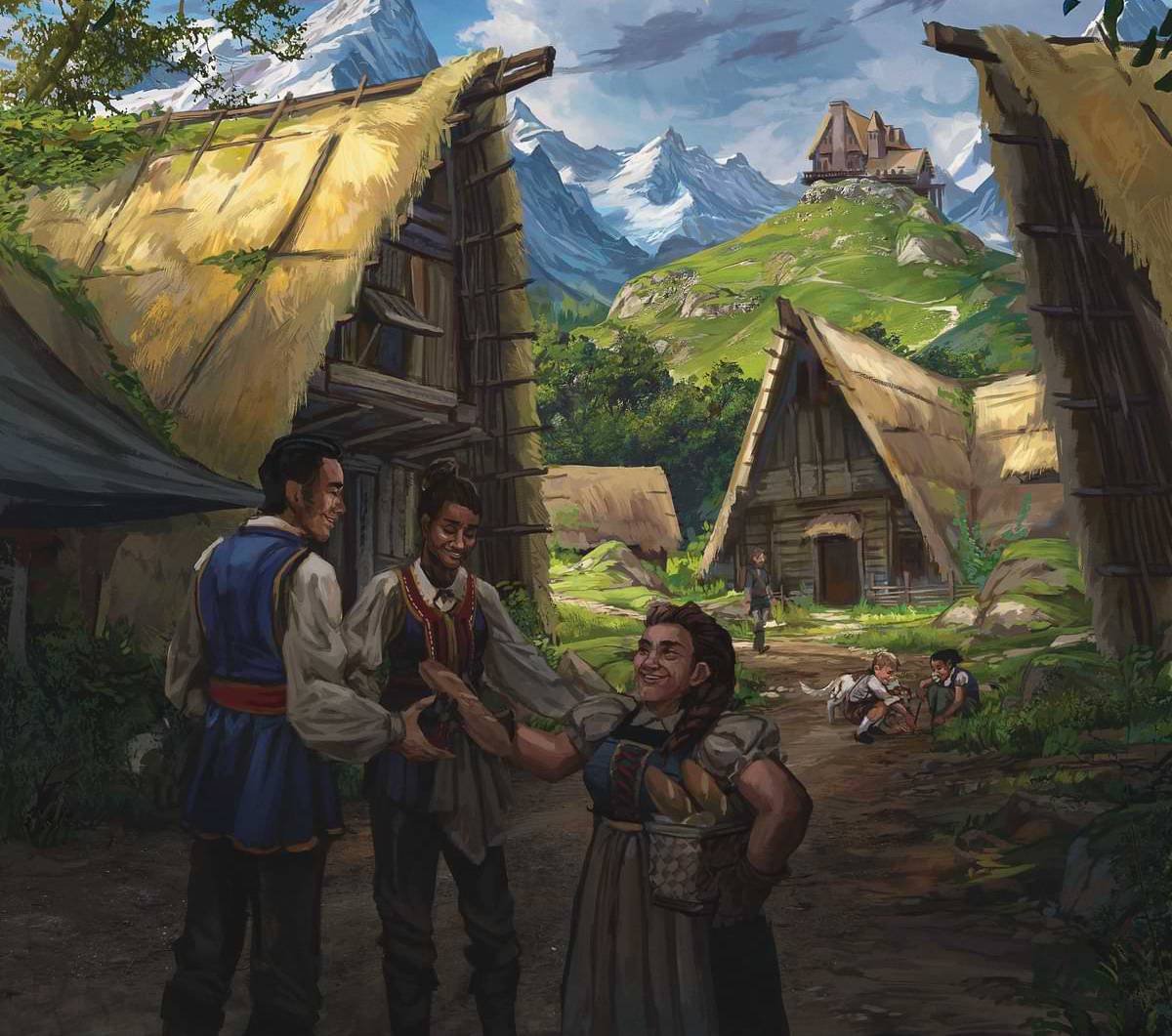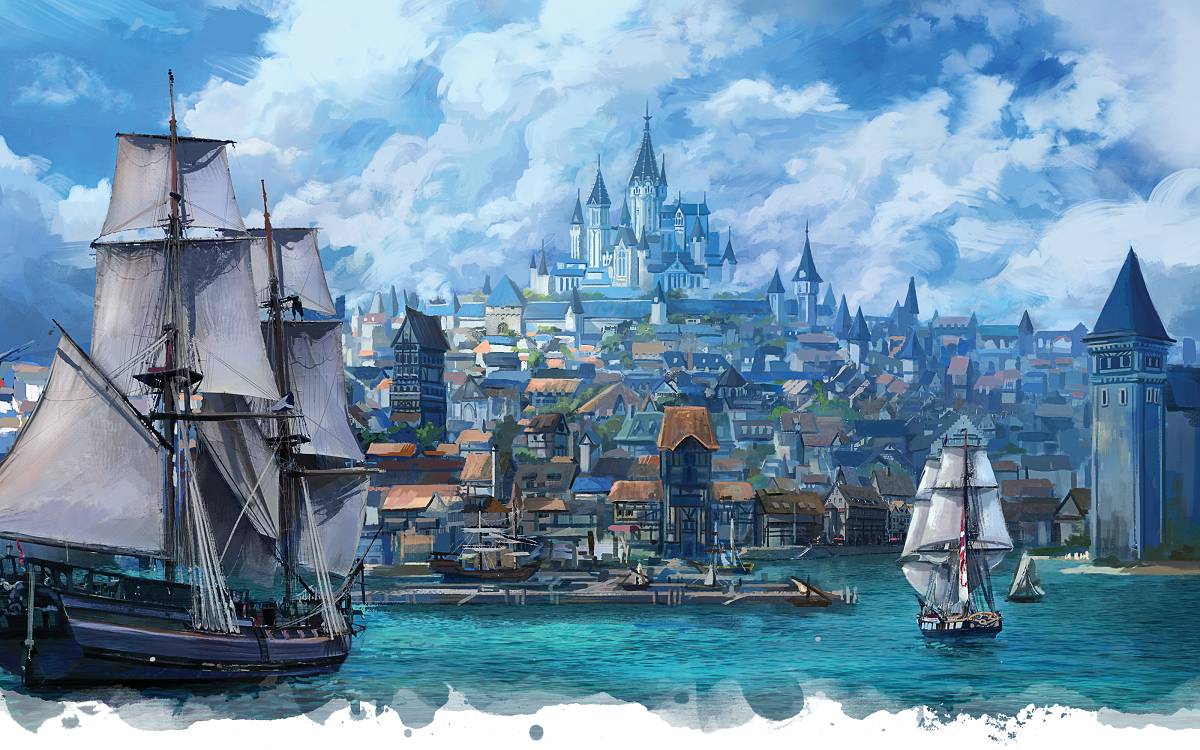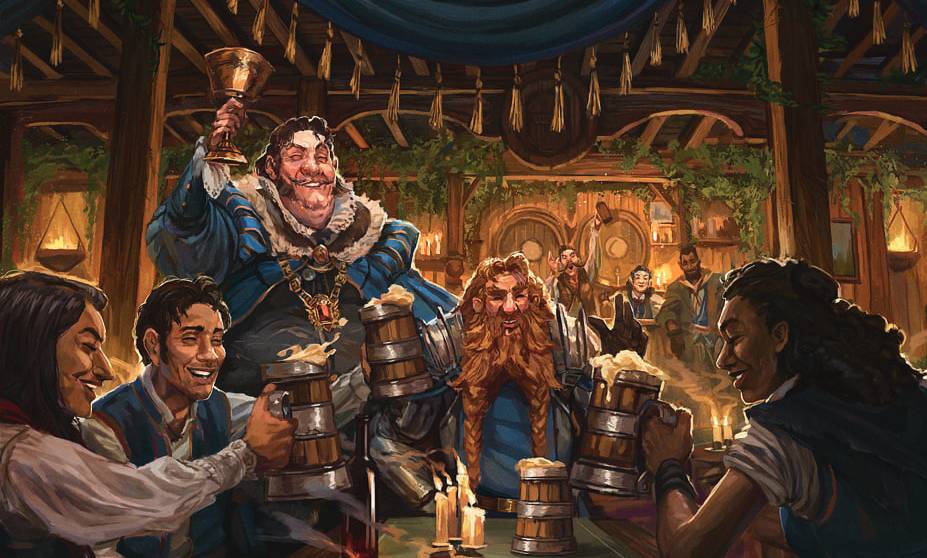After a long adventure, nothing feels better than getting back to your hometown. The familiar streets, routines, and people all give you a sense of safety and calm. Most importantly, you get to go home. Home is where all your stuff is. You get to walk in the door, kick off your boots of elvenkind, and change out of your armor and into your comfy pants.
Having a place that your players can come back to between adventures is often overlooked in long-term campaigns, but is certainly something present in Phandelver and Below: The Shattered Obelisk. In this article, we’re taking a look at setting up a hub city and how to give your players a base of operations.
- Establishing a Hub City in Your Campaign
- Phandalin As a Home Base
- How to Run a Hub City
- Setting Up a Base of Operations
Establishing a Hub City in Your Campaign

Hub cities are valuable tools to ground your campaign. Once established, they can be excellent set pieces to sow story seeds, foster character development, and catalyze plot twists.
A hub city is a centralized location where your adventurers can rest, recuperate, and prepare for their next quests. Unlike a city campaign, where the entire adventure takes place in a single city, hub cities are meant to be used as a home base to strike out from on adventure.
When you’re looking to set up a hub city for your players, it’s important to think about the campaign you’re trying to run. A political intrigue-type game about competing city-states will benefit from having a city like Baldur’s Gate as the party’s hub city, whereas an adventure focused on exploring ruins and delving into dungeons might benefit from a remote settlement like Phandlin.
Phandalin has been used as a hub in Lost Mine of Phandelver, Dragon of Icespire Peak, and now in Phandelver and Below: The Shattered Obelisk. The latter being the most extensive use of the city, as the adventure runs from 1st-12th level and features several dungeon crawls in the surrounding area.
Phandalin has some defining characteristics that allow it to thrive as a hub:
- The townsfolk need the player's help. Even goliath barbarians with a Strength score of 20 want to feel wanted. By helping the townsfolk solve their problems, the party creates a sense of appreciation from the people of Phandalin and make it a more habitable place to settle down and spend some downtime after adventures.
- They have supplies for the players. Phandalin contains a trading post for adventuring gear, an armory for weapons and armor, a shrine, and, most importantly, two bars. While it isn’t a bustling metropolis, it provides adventurers with some opportunity to go shopping and spend their well-earned gold.
- It contains plot hooks. Phandalin is full of NPCs who need the party’s help in one way or another. While some of these quests are subplots, the town contains story seeds central to the adventure. This is the main thing that will keep the party returning in the early days of establishing the settlement as a hub.
- It’s close to adventure. When the party is striking out to Wave Echo Cave, Cragmaw Castle, or one of the surrounding quests, Phandalin is usually the most convenient location for the party to return to when they need to rest and restock.
How to Run a Hub City

Whether you’re playing an official adventure or crafting your own campaign, it’s important to make the hub city feel dynamic and lively.
If your hub is stale and doesn’t respond to the campaign's events, players can get detached and generally bored by the notion of returning. Done right, however, and returning to these hubs can be something that players eagerly anticipate as they head home from their adventures.
NPCs
It's one of the laws of the universe that players will always fall in love with NPCs you had no intention of being more than a one-time guest appearance. While that’s just one of the things you have to roll with as a DM, you can also use it to your advantage to build out hub cities.
Whether it’s the goblin bard that plays at the party’s favorite watering hole or the quirky owner of a magic item shop, once the party has made a connection, interactions with these key NPCs will help keep your city feeling alive.
Side Quests
Not every conflict the party faces has to determine the fate of the multiverse. Hub cities are an excellent opportunity to break up a serious primary campaign with fun subplots. Maybe the city council comes to the party to deal with a giant alligator in the sewers, or perhaps an old lady just needs help getting her cat out of a tree.
These little side quests help build character relationships and make players care more about their hub city. Then, when it comes time to save the world again, they’re refreshed and ready for some real stakes.
Downtime
Speaking of ways to break up the campaign, sometimes the players just need a little R&R. When you have a hub city to go back to, your players can think of their characters in an entirely different way than when actively playing them in an adventure.
Sure, your wizard can cast fireball to blow their foes to pieces, but what do they do for fun? When your players are invested in the hub, they could get involved in local politics, a guild that interests their character, or some of the various other downtime activities listed in the Dungeon Master’s Guide.
Setting Up a Base of Operations

What’s a hub city if you don’t have a home base? More often than not, a base of operations is acquired around the same time the party saves the city they’ll call their home. These locations can be purchased, but c’mon, 50,000 gp for a keep? Plus, roughly 3,000 gp a month for upkeep? Real estate prices truly are getting out of hand.
If you’re looking for ways to give your players a base without making them fork over cash, check out this homebrew rollable table:
| d6 | Result |
|---|---|
| 1 | The mayor gives them an abandoned manor at the city limits as thanks for saving the town. |
| 2 | They receive a ramshackle inn in exchange for completing a quest (à la Waterdeep: Dragon Heist). |
| 3 | They stumble across an abandoned dwarven home carved into a rock just outside the city. |
| 4 | One or more players get a spot on the council, providing them with a city residence. |
| 5 | After completing a quest for the mage’s guild, they’re given a permanent magnificent mansion that can only be accessed from a certain location in the city. |
| 6 | The party becomes the city’s rulers and takes up residence in the castle at the center of town. |
“But,” you might be asking, “why does the party need a stronghold? Can’t they just grab a room at the local inn?” And while they could just spend their downtime in a hotel, let’s explore some indisputable evidence as to why every party needs a base of operations:
A Place to Call Their Own
Every group of heroes (or villains, for that matter) worth their salt have a base. The Avengers have Avengers Tower, the Justice League has the Watchtower, and the Masters of the Universe have Castle Grayskull. Having a dedicated space offers players a canvas on which they can leave their mark on the world, both literally and metaphorically. It's also a place where they can store their loot, take on projects, and perhaps even start a side business.
You could even task your party with creating a map of their base. That way, they can visualize their space more effectively, and it will take work off your plate when you inevitably have enemies invade their compound for a fight (evil DM laughter).
Setting Up Permanent Defenses
Speaking of invasions, players will undoubtedly want to set up some home defense systems, especially if they’re storing the powerful (and probably cursed) magic items they find during their adventures there.
There’s a sizable subsection of spells and effects meant to make permanent residences more defensible. Hallow, guards and wards, and glyph of warding all have long casting times and cost a lot of gold, but they make their protected area much safer against supernatural and mundane incursions.
You could also flip through the Player’s Handbook and see that skilled hirelings—which include mercenaries—only cost 2 gp per day, so you could just contract out your guard force instead.
And while we’re talking upgrades, you’ve got to get yourself a permanent teleportation circle. It’ll only take a year and cost around 18,250 gp.
Your Keep Awaits
Providing players with a hub city and base of operations can add layers of depth and engagement to your D&D campaign. It allows players to feel rooted in the world, offers downtime activities, and provides a place where players can devote their hard-won resources.
When your players are nomads, going from one city and quest to the next, they can quickly come to dismiss the needs of everyday citizens in your world. Once they have their own citizens to care about, the emotional connection will make campaign events feel much more impactful!
Mike Bernier (@arcane_eye) is the founder of Arcane Eye, a site focused on providing useful tips and tricks to all those involved in the world of D&D. Outside of writing for Arcane Eye, Mike spends most of his time playing games, hiking with his girlfriend, and tending the veritable jungle of houseplants that have invaded his house.








-
View User Profile
-
Send Message
Posted Sep 1, 2023Huh. Neat
(bippity boppity boo, i destroy the city with meteor swarm)
-
View User Profile
-
Send Message
Posted Sep 1, 2023D&D be like, players don't have anything to spend their gold on, but also GIVE THEM A 50000 GP HOUSE FOR FREE!
I wonder what the problem is 🤔
-
View User Profile
-
Send Message
Posted Sep 1, 2023Magnificent Mansion can't be made permanent, lol /nm
-
View User Profile
-
Send Message
Posted Sep 1, 2023lol 100% this. Stop giving them free stuff all the time, and let them earn it with cash they get from adventuring! It'll take longer to get, but they'll VALUE it way more. Plus, it means they'll get to go on more adventures! Isn't that why we're playing D&D in the first place?
-
View User Profile
-
Send Message
Posted Sep 1, 2023Rundown shack homes , regardless of quality, are very very common in the real world. I mean, it's not free if you have options to upgrade or better the base. I don't see what the complaints are. Granted, perhaps, you may not have a bit of imagination. Who knows.
-
View User Profile
-
Send Message
Posted Sep 1, 2023This stuff I like.
-
View User Profile
-
Send Message
Posted Sep 1, 2023Does Phandelver have a secured money house for large deposits, and other financial transactions? Or do players have to spend all their gold to hire mercenaries? Which would take all their gold. I still have seen no sign of a magic goods vendor. Yes, hire mercenaries. they rob you and leave you bleeding to death in the dark cold stronghold. I like that option.
-
View User Profile
-
Send Message
Posted Sep 2, 2023It can. "The Joy of Extradimensional Spaces," in Candlekeep Mysteries.
"The Joy of Extradimensional Spaces was donated to Candlekeep with the rest of the library of the mage Fistandia, following her untimely disappearance. In her will, Fistandia bequeathed her collection to Candlekeep in appreciation for the many years she spent in its hallowed halls. This book is a treatise on extradimensional spaces similar to those created by the Mordenkainen’s magnificent mansion spell. This information alone would make it worthy of note, but Fistandia’s additions in the margins are even more interesting. In arcane shorthand, she details how she created a permanent Mordenkainen’s magnificent mansion spell and records the command word to open the mansion’s doorway."
-
View User Profile
-
Send Message
Posted Sep 2, 2023Kings had this very problem also.
How did they get around it? Normally vengeful family and friends to start with. Inheritable title and property to end with.
-
View User Profile
-
Send Message
Posted Sep 2, 2023That'll take too long, this is what storm of vengeance is for.
The player casted version of magnificent mansion can't be, but a DM provided version can do whatever they want; it can be 40 miles cubed inside with a small army of unseen super models beat-boxing 24 hours a day, with infinite solid gold toilet paper in every room. Oh and, careful, the floors literally are lava, so it's furniture based navigation only in here, and the rooms get 5 feet smaller every hour before resetting, so don't stay inside too long…
-
View User Profile
-
Send Message
Posted Sep 2, 2023Nice read!
-
View User Profile
-
Send Message
Posted Sep 2, 2023About half a block actually*
-
View User Profile
-
Send Message
Posted Sep 2, 2023Another benefit of giving them a keep; it’s way more personal if the bad guys make a midnight ambush there rather than at some temporary inn. My players were using a city house as a base of operations, had a miniboss and his goons set a chunk of it on fire to smoke them out/try to kill them. Think that’s possibly the most outraged at at a bad guy the party ever got XD
-
View User Profile
-
Send Message
Posted Sep 2, 2023I agree. Giving them a stronghold as a reward can be beneficial, especially for a long running campaign. However, it is important to make them earn it. If they want more than a safe place to sleep, they have to spend resources and downtime to build it out and then defend it and keep it running.
-
View User Profile
-
Send Message
Posted Sep 2, 2023This is not bad honestly, I'm just against giving fully functional strongholds in no need of repair to the party for free.
Obviously if you make them pay to repair it it's not free and thus not even close to what I'm talking about.
-
View User Profile
-
Send Message
Posted Sep 2, 2023I love the mention of the downtime activities in the DMG when Xanathar's exists to replace almost all of them. Regardless, good read! I've just started a campaign playing through the sequel adventures to Dragon of Icespire Peak and trying to make Leilon a home base has been something weighing on me for a bit.
-
View User Profile
-
Send Message
Posted Sep 2, 2023Hex crawls and rolling for both treasure and wandering encounters are your best friends when running these types of games.
Also the 5e DMG dungeon generator is pretty good for one the fly or planned dungeon crawls.
And how could I forget; Downtime.
When running an adventure Hub, utilising Downtime from XGE really gives the setting/location a chance to breath. Growing broader and deeper.
-
View User Profile
-
Send Message
Posted Sep 2, 2023This was covered well in Basic D&D, honestly. 👍
-
View User Profile
-
Send Message
Posted Sep 2, 2023It was. But it's still cool to read about people's spin on it. I don't think I've ever met anyone who uses straight vanilla content in their home games,and I have run into plenty of players who either think a stronghold is boring or not powerful enough to be worthwhile... kind of like the Baldur's Gate 2: Shadows of Amn game... strongholds were a neat idea, but not nearly as interesting as they could have been.
-
View User Profile
-
Send Message
Posted Sep 3, 2023Mike, why are they always your articles that are the most useful? Keep writing (and supporting giving players free stuff!)
I am currently working on a homebrew Wildspace campaign (based on *Treasure Planet* ofc) and I am planning on making a ship of the party's choice their homebase.